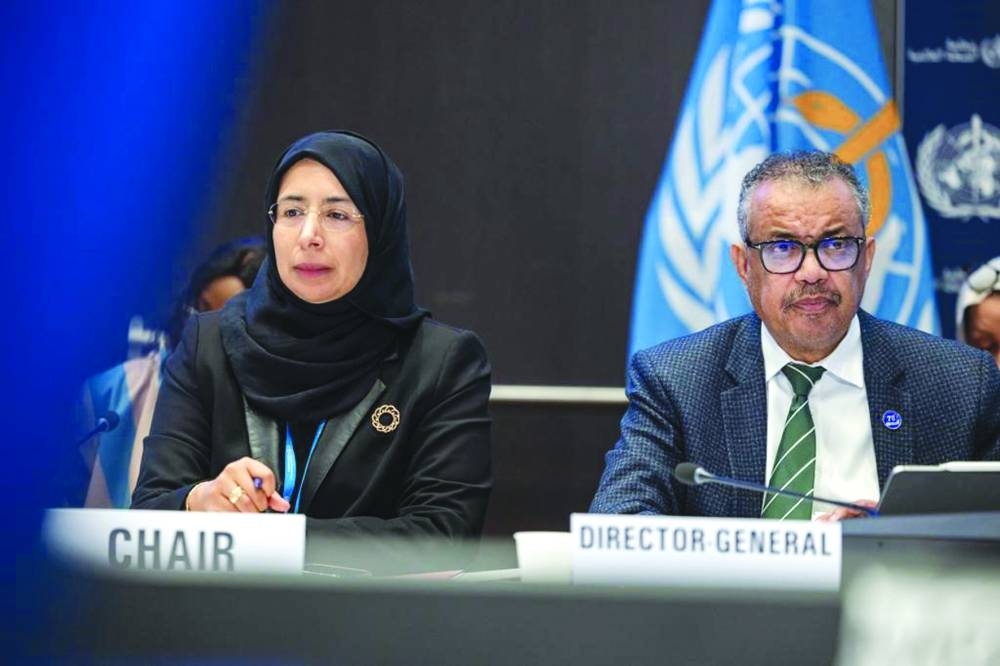Qatar is taking part in the meetings of the 154th session of the World Health Organisation (WHO) Executive Board, which started in Geneva on Monday and continues through Jan 27. HE the Minister of Public Health and Chairperson of WHO Executive Board Dr Hanan Mohamed al-Kuwari heads Qatar's selegation to the meetings.
In her opening speech, HE Dr al-Kuwari stressed that the year 2023, which coincided with the 75th anniversary of the founding of the WHO, was a very important year for the organisation, as it saw the affirmation of its role and its commitment to promoting its strength and funding.
She pointed out that the current year is equally important to demonstrate the values and commitment of the WHO to work towards promoting and protecting the health of all people. HE Dr al-Kuwari also pointed out that the informal meeting of the Executive Council of the WHO, which was hosted by Qatar early last month, provided the opportunity for an in-depth review of some critical priority issues in the current session of the Executive Board, including the drafting of the 14th General Programme of Work, sustainable financing, negotiations for the International Compact on Epidemics, the mechanism for electing regional directors, and necessary reforms.
Such issues are of great importance in shaping the global health agenda and strengthening governance in the future, she said. The Executive Board meeting is being held while the world is going through very difficult time, as conflicts are occurring in different countries, health facilities are affected and often destroyed, and a number of health professionals have been injured or killed, HE Dr al-Kuwari said.
She indicated that the members of the Executive Board held a special session on the Dec 10, to discuss the conflict in Palestine and reached a consensus on a resolution calling for, among other things, ensuring respect and protection for all medical and humanitarian workers in the region. For his part, WHO Director-General Dr Tedros Adhanom Ghebreyesus said in his opening remarks that the dawning of a new year gives the opportunity to look forward with hope, and to look back on the year that has been.
In 2023 "there were also many achievements and milestones, including the end of COVID-19 and mpox as global health emergencies.
"2023 was a reminder of why the work we do is so important, and why the world needs a strong, sustainable, effective, efficient and empowered WHO," he said.
He pointed out that the most important items on the agenda of the Executive Council meetings of the World Health Organization are the draft 14th general work programme, noting the achievement of many major achievements during the past year in the areas of health promotion, including the number of smokers is 19 mn less than two years ago, providing support to more than 80 countries to integrate services related to non-communicable diseases into their health systems, and supporting more than 50 countries to build health systems capable of resilience to climate change.
He said that with regard to TB, more than 7.5 mn people with TB have access to diagnosis and treatment in 2022, the largest number since WHO started monitoring almost 30 years ago.
He pointed out that with regard to HIV, more than 75 % of people infected with the virus globally are now receiving antiretroviral therapy, and almost all of those on treatment are achieving viral suppression, which means they cannot infect others.
At the political level, world leaders at the UN General Assembly High-Level Meeting agreed a strong political declaration, including a commitment to conclude negotiations on the pandemic agreement and amendments to the International Health Regulations by May this year, he said.
This year's UN General Assembly high-level meeting on antimicrobial resistance will be another important opportunity to secure concrete commitments for this urgent global threat, which kills at least 1.3 mn people every year. he added.
The 154th meeting of the WHO Executive Board is set to discuss over 40 health topics, including WHO's 14th General Programme of Work (GPW14); health emergency prevention, preparedness and response; accelerating national and global responses to antimicrobial resistance (AMR); and the impact of climate change on health, among other priority issues.
The WHO Executive Board is composed of 34 technically qualified members elected for three-year terms. The main functions of the Board are to implement the decisions and policies of the Health Assembly, and to advise and facilitate its work.

HE the Minister of Public Health and Chairperson of WHO Executive Board Dr Hanan Mohamed al-Kuwari participating in a session with WHO Director-General Dr Tedros Adhanom Ghebreyesus.
